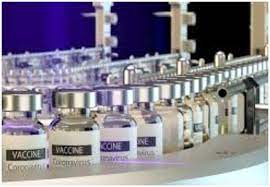The report, titled ‘Legislative Responses to COVID-19 in Nigeria,’ was a study of the effect and responses to coronavirus pandemic by Nigeria’s legislature and lessons learnt.
Lawan said, “Today, the US is trying to ensure that no vaccine leaves its shores until it is able to vaccinate its citizens enough to provide herd immunity. The European Union is doing the same thing. India that produces quite a lot of vaccines with over one billion population is also controlling and stopping exports. Where does that leave us?
“Nigeria has the capacity in terms of the human resources, to some extent, even though we have lost most of our good ones to the developed world. But some of them are very patriotic. They still want us to have our own vaccine developed, and this means we have to find resources for setting up the environment for our scientists to collaborate with international agencies as well as citizens who are now either holding dual citizenship in other countries or are simply our citizens who have gone for greener pastures.
“For us to have our own vaccines, it is a must; it is a necessity; it is inevitable, otherwise, Nigeria may not achieve the herd immunity in the next four or five years with our over 200 million population.
“This is not a fact based on any scientific research. I don’t want to be misquoted. I am assuming that if it would take the US up to probably the end of this year to achieve 70 to 75 percent of vaccination for those that are within the age bracket, some developed countries may be looking at next year.
“With over 200 million, so far we have only vaccinated about four million [sic].
According to the National Primary Health Care Development Agency, as of March 31, 2021, approximately 718,412 persons have been vaccinated in 36 states and the Federal Capital Territory.
“I don’t know how we can get 70 percent of our people vaccinated and that will translate into about 150 million or even more, to vaccinate them in the next two or three years. So, we need to work hard and provide the legislative intervention in terms of resources and environment for our scientists to work.”
The Senate President added, “I listened to a Nigerian scientist who is based in the US yesterday and he said it would require only one year for a Nigerian project to get its own vaccine. And the vaccine is not supposed to be for Nigerians only and that is why we need international collaboration. It would be a vaccine that can be easily used by other countries, even though when we are able to achieve that, we would also target our population first like all other countries are doing.”
Speaker of the House of Representatives, Femi Gbajabiamila, also said the report would contribute to the body of knowledge on legislative responses in dealing with emergencies such as the COVID 19 and other pandemics that might emerge in the future.
Chairman of the YPF, Kabir Tukura, also said the report would provide an in-depth analysis of the various interventions made by the National Assembly and the state Houses of Assembly as well as other interventions provided by Nigeria and four other countries.
Tukura noted that though COVID-19 had created unprecedented challenges to legislative duties across the world, innovative techniques had been deployed to connect the public with legislative actions and urgent palliatives provided for communities in need.
He stressed that parliaments across the world had made efforts to mitigate the risks through necessary legislative reforms and ensure adequate public funding for sensitive sectors such as the public health system.
Clerk to the National Assembly, Amos Ojo, said the pandemic caught legislators napping and to a large extent, they were unable to effectively carry out their statutory roles. He added that the inability to switch from physical and paper based operations to digital and virtual forms further exposed the “soft underbelly of the state and National Assembly in reacting in a timely manner.”
Ojo noted that with the support from the WFD, the YPF undertook the study in order that lessons be learnt from individual and collective responses. He stressed that the effort unearthed the best legislative adaptable strategies and practices to meet the COVID-19 and similar challenges in future.
Country Representative, Westminster Foundation for Democracy, Mr. Adebowale Olorunmola, who presented the report, commended the leadership of the 9th National Assembly for their efforts, through legislative instruments, to curtail the spread of the pandemic.
Olorunmola also said the research work is expected to contribute to existing and emerging body of knowledge in legislative response in dealing with emergencies and also to serve as a guide to Nigeria’s Legislatures on steps to take in a time of similar situations in the future.
source: Punch

 President of the Senate, Ahmad Lawan, has called for concerted efforts towards developing COVID-19 vaccine locally. He stated that vaccine production has become a necessity for almost every country, urging Nigeria to create an enabling environment and allocate resources for its production.
President of the Senate, Ahmad Lawan, has called for concerted efforts towards developing COVID-19 vaccine locally. He stated that vaccine production has become a necessity for almost every country, urging Nigeria to create an enabling environment and allocate resources for its production.




